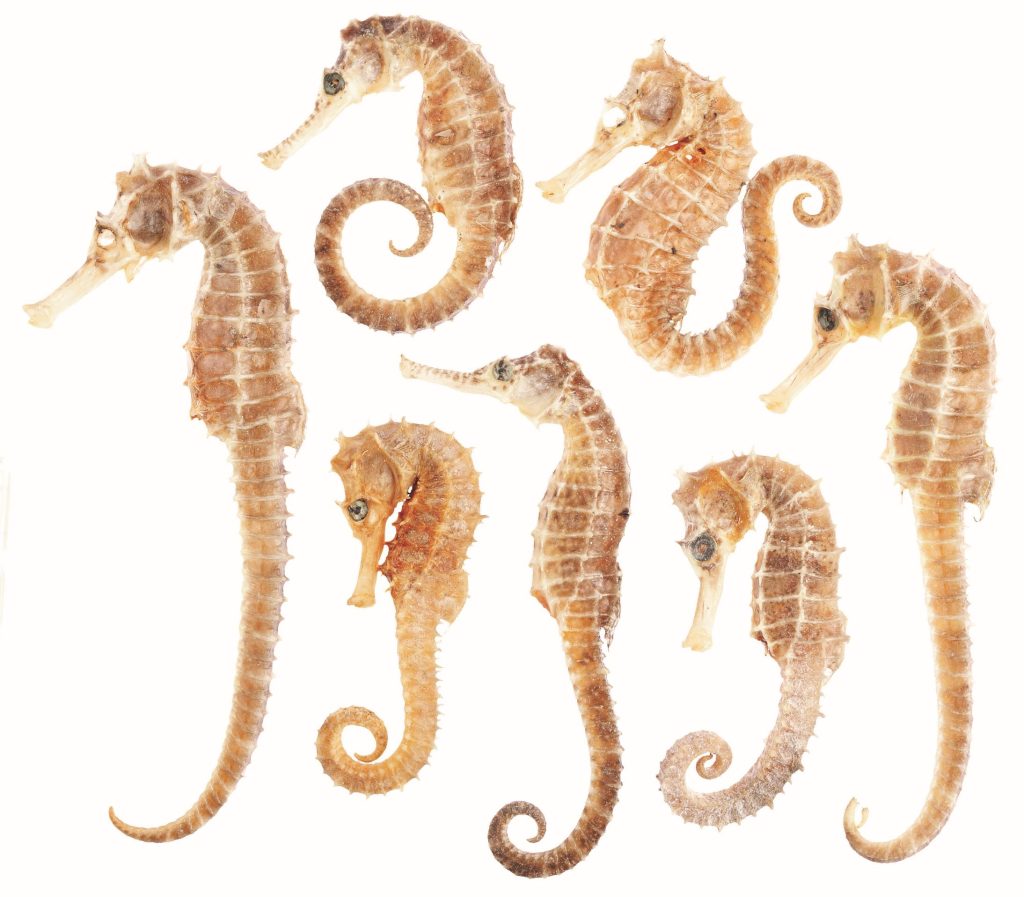Sea Horse

What is Sea Horse?
Sea Horse (hai ma, 海马) is a type of fish with a long, curling tail and a spiny body found throughout the world’s oceans. It has a crowned head and a protruding snout that resembles a horse. Sea Horse is an important symbol in Chinese culture as the Chinese believed that this animal is a type of sea dragon, which is a symbol of good luck. The Sea Horse symbolizes patience and protection, likely due to its bony exoskeleton that resembles an armour. People believed that the consumption of Sea Horse can protect or improve the health of our internal organs.
Today, many species of Sea Horse are on the brink of extinction due to intensive trawling and destructive fishing methods. Hence, when we buy Sea Horse for consumption, it is important to check with the stores and your healthcare provider on the type and source of Sea Horse that you are buying in order to protect these species.
Sea Horses are caught then dried under the Sun before medicinal usage. The larger the Sea Horse, the more potent it is believed to be. In Traditional Chinese Medicine (TCM), Sea Horse is extremely popular as a male aphrodisiac and for promoting Kidney yang.
Warm in nature, Sea Horse can help individuals who have too much Cold in their body, such as those experiencing a Yin Excess or a Yang Deficiency, to restore a healthy yin-yang balance. Sweet in taste, the herb can slow down acute reactions, detoxify the body and has a tonic effect on the body by replenishing qi and blood. In particular, the herb targets the Liver and the Kidneys.
Functions and Benefits of Sea Horse
According to TCM, it is believed that Sea Horse has the following health benefits:
Sea Horse can tonify the Kidneys, strengthen yang, regulate qi and invigorate blood. Thus, one of its most common uses is to improve blood flow in men as a natural sexual stimulant to increase sexual potency. It is believed to be one of the most powerful aphrodisiacs in Chinese culture. For example, it can help to address impotence, premature ejaculation, decreased potency, painful erections and reduced libido.
It is believed that dried Sea Horse can treat Kidneys and respiratory diseases. Sea Horse also helps to address symptoms such as urinary incontinence, wheezing, asthma, dystocia, sores, boils, enuresis, insomnia, and abdominal pain. Sea horse can also be applied to the skin to treat skin infections and sores.
Also, Sea Horse can treat disorders of the throat, such as inflammations, infections, abscess, swollen lymph nodes and accumulation of phlegm. Many individuals use Sea Horse in soups with boiled pears and apples as a remedy to soothe sore throats and coughs.
Sea Horse can help to improve circulatory health by providing relief to heart disease, high cholesterol levels, circulatory problems and arteriosclerosis. The herb is also used in difficult childbirth sometimes to promote labor.
How to Use Sea Horse
The recommended dosage of Sea Horse is 3 – 9g when mixed with boiling water and drunk as a decoction, and 1 – 1.5g when used in the form of powder. However, the exact amount of Sea Horse to be consumed depends on the condition being treated.
To treat impotence, some healthcare practitioners recommend a mixture of 3g of powdered Sea Horse taken three times per day with rice wine. Powdered Sea Horse can also be applied externally too.
Whole, dried Sea Horses can be found at some herbal shops and Asian markets. Powdered Sea Horse is also available in the form of pills, powder and capsules. Sea Horse is often consumed via soup, with other ingredients added to it, such as pork and red jujubes. The herb is also used in alcohol or tea to facilitate parturition by increasing sexual potency.
If you are buying dried Sea Horse, do make sure to purchase species that are least threatened. Do not purchase pregnant male Sea Horses, as their young have died with them, which reduces the prospects for population recovery. Also, avoid pre-packaged medicine containing Sea Horse as these often include juveniles that have been collected before they can reproduce.

Cautions and Side Effects of Sea Horse
Sea Horse should not be used by individuals experiencing Yin Deficiency with effulgent Fire. Pregnant ladies should also avoid consuming the herb for the time being. In addition, long-term use of Sea Horse in high doses could lead to possible Kidney damage.
Individuals who are suffering from weak digestion or internal Heat symptoms such as night sweating, hot flushes or constant thirst are not recommended to take Sea Horse.
We strongly recommend you to consult your healthcare provider before deciding to add Sea Horse to your healthcare routine.
Summary
Here is a summary for Sea Horse:
- Herb name (Chinese): 海马
- Herb name (Pin Yin): hǎi mǎ
- Herb name (English): Sea Horse
- Herb name (Botanical): Hippocampus
- Origin of species: Hippocampus kelloggi Jordon et Snyder; Hippocampus histrix Kaup; Hippocampus kuda Bleeker; Hippocampus trimaculatus Leach; Hippocampus japonicus Kaup
- Part(s) of herb used: Whole organism
- Geo-specific habitat(s): Guangdong, Shandong, Qinghai, Liaoning, Fujian
- Taste(s) & Properties: Sweet, Salty; Warm; Administrates the Kidney and Liver Meridians
- Actions: Eases symptoms of erectile dysfunction, premature ejaculation or weak control over bladder; Helps to improve blood circulation in the body to relieve pain resulting from physical injuries
References
Law, S. (2021). Dried seahorse in traditional medicine: a narrative review. Infectious Diseases and Herbal Medicine, 2(1). [Accessed on 16th November 2022]
Pangestuti, R., Ryu, B., Himaya, S. W. A., & Kim, S. K. (2013). Optimization of hydrolysis conditions, isolation, and identification of neuroprotective peptides derived from seahorse Hippocampus trimaculatus. Amino Acids, 45(2), 369-381. [Accessed on 16th November 2022]
Share this article on
